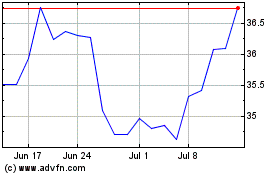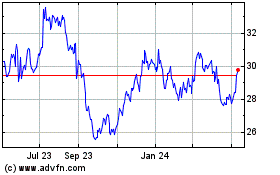By Suzanne Vranica
A recent spate of high-profile scandals on Madison Avenue
involving accusations of sexist and racist behavior has put the
spotlight back on the advertising industry's lack of diversity. And
now marketing clients are starting to leverage their budgets to
insist on change.
Antonio Lucio, the chief marketing officer of HP Inc., sent a
letter to HP's advertising and public relations agencies on
Thursday demanding that they improve the makeup of their workforces
by hiring more women and minorities. Mr. Lucio, who previously
spent years as marketing czar for Visa Inc., has asked his agencies
to come up with a plan to diversify their ranks within the next 12
months.
In the letter to HP's five agencies, Mr. Lucio requested that
each one submit a plan within 30 days that lays out how the firm
will significantly increase the number of women and minorities in
key creative and strategy roles.
"Including women and people of color in key roles is not only a
values issue, but a significant business imperative," the letter
said.
HP's agencies include Omnicom Group's BBDO, Fred & Farid and
Dentsu's Gyro. It also uses two Omnicom PR firms. The technology
company isn't setting specific goals for each agency, but Mr. Lucio
said he expects agencies to have 50% female representation, which
is the gender makeup of HP's marketing department.
If agencies don't comply, Mr. Lucio said "anything is on the
table," including removal from HP's roster.
HP, the personal computer and printer arm of the former Hewlett
Packard Co., is putting pressure on its agencies to hire workforces
representative of the broader population as the lack of diversity
in industries from entertainment to technology becomes a hot-button
issue. Madison Avenue has been grappling with the criticism for
decades, but the issue has been reignited as of late after a number
of incidents that have attracted international attention.
The chief communications officer of WPP's J. Walter Thompson
filed a harassment lawsuit against former CEO Gustavo Martinez,
earlier this year -- charges he has denied.
Other incidents have included the recent resignation of a top
Publicis Groupe executive, Kevin Roberts, following comments he
made that were dismissive of the importance of gender diversity in
the ad business. A top Omnicom Group executive also stepped down in
June after allegations of discriminatory behavior.
While women make up about half of the advertising industry, they
represent only 11.5% of its creative directors, according to the 3%
Conference, a movement dedicated to building a business case for
more female creative directors in advertising.
Overall the advertising business has a "poor score" on
diversity, said Mr. Lucio. He added that the sector does have a
"significant participation of women at the lower level" but has a
problem with moving women up the ladder.
Mr. Lucio "knows about BBDO's commitment to double the number of
female senior creative leaders we have in one year and obviously
supports it," said Andrew Robertson, BBDO's chief executive
officer. "His initiative to formalize an action plan on his
business is something we welcome."
Gyro Chief Executive Christoph Becker said HP's demands "are
critical, timely and something necessary in the industry." Gryo has
been working to improve its diversity, he added.
Palo Alto, Calif.-based HP isn't the only firm to push for
change. General Mills Inc. is requiring that creative agencies
currently competing to win the food giant's creative business must
be staffed with at least 50% women and at least 20% people of color
within the creative department. General Mills said that "agencies
don't need to be at that level today, but we will have meaningful
conversations with our partners to ensure they understand the
importance of this shared commitment." Advertising Age earlier
reported the General Mills news.
Some of the onus for change does lie with the marketing client,
who should demand diversity at the agencies it hires because it
will help them be more successful, argues former advertising
executive and consultant Cindy Gallop.
"Clients have the leverage because they are paying the fees,"
she said this week on the WSJ Media Mix podcast. "I would love to
see many more clients using that leverage because they have the
power to transform our industry."
Mr. Lucio couldn't say why it's taken so long for marketers to
demand real change given that women control so much of household
spending. He said that HP's push for more diversity in the ad
business was prompted in part by the fact that women buy 53% of
personal computers and 45% of printers.
HP, is also holding itself accountable, saying it has been
trying to improve the makeup of its own workforce. Tech companies
have been under a microscope for their lack of diversity since
major companies like Facebook, LinkedIn and Google started publicly
releasing diversity data a couple of years ago that showed Silicon
Valley workforces are short on women, African-American and Latinos
in the upper ranks.
HP said its doesn't yet have any numbers on the diversity
breakdown of its overall workforce since Hewlett-Packard Co. split
last year. The company split into Hewlett Packard Enterprise Co.
and HP Inc. last fall.
Before the separation, women made up 33% of Hewlett-Packard's
global workforce. The company at that time didn't release the total
number of minorities in its workforce.
HP's global marketing team, which includes roughly 1,000
employees, is about 55% female and 30% of the staff consider
themselves people of color, the company said.
"We are going to need to make much bigger progress among
African-Americans and Latinos," Mr. Lucio said.
Write to Suzanne Vranica at suzanne.vranica@wsj.com
(END) Dow Jones Newswires
September 02, 2016 08:58 ET (12:58 GMT)
Copyright (c) 2016 Dow Jones & Company, Inc.
HP (NYSE:HPQ)
Historical Stock Chart
From Mar 2024 to Apr 2024

HP (NYSE:HPQ)
Historical Stock Chart
From Apr 2023 to Apr 2024
